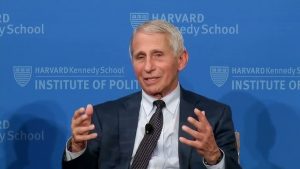As rumors circulate about President Joe Biden potentially issuing preemptive pardons for individuals targeted by future prosecutions if Donald Trump regains the presidency, one name at the forefront of this speculation is Dr. Anthony Fauci. Fauci, the former director of the National Institute of Allergy and Infectious Diseases, became a contentious figure during the pandemic for his involvement in shaping national health policies.
Biden's Potential Pardons Spark Controversy Over Fauci's Pandemic Role

Biden's Potential Pardons Spark Controversy Over Fauci's Pandemic Role
Speculation rises as President Biden considers pardons for Trump-era prosecutions, notably for Dr. Anthony Fauci amid ongoing disputes.
In a recent appearance on “The Glenn Beck Program,” Senator Rand Paul voiced his concerns regarding Fauci’s historical role in funding research that has sparked global controversy. "I’ve sent criminal referrals on Anthony Fauci twice to the Department of Justice without a response," Paul stated, directing criticism towards Attorney General Merrick Garland and suggesting he would re-submit those referrals if Biden acts to pardon Fauci.
Paul has been a longstanding critic of Fauci, particularly regarding allegations of gain-of-function research tied to the origins of COVID-19. He accused Fauci of circumventing safety protocols that were designed to oversee studies involving potentially dangerous pathogens, thereby allowing risky research in Wuhan to proceed without adequate review. Paul asserted, “There have been scientists warning about this for 20 years, and Fauci sidestepped the safeguards in place to prevent exactly what happened.”
In addition, Paul challenged Fauci's responses to inquiries about his involvement in this research. “When it came forward that he had done it, he was like, ‘Oh, nothing to see here,’” Paul commented, labeling Fauci’s explanations as deceptive. He characterized Fauci's claims regarding gain-of-function research as fundamentally misleading, dubbing them “a lie.”
Paul also posited that a presidential pardon would not protect Fauci from the court of public opinion. “If the president pardons him, I think it’ll just cement his role in history as being the architect of gain-of-function,” he argued. Glenn Beck, the host of the program, voiced agreement with Paul, suggesting that future Trump appointees, such as Kash Patel, could be instrumental in holding Fauci accountable.
As speculation regarding Biden’s possible pardons intensifies, the debate surrounding Fauci’s actions continues to polarize public opinion, bringing into focus larger issues of governmental accountability and the repercussions of the pandemic on American society.
Paul has been a longstanding critic of Fauci, particularly regarding allegations of gain-of-function research tied to the origins of COVID-19. He accused Fauci of circumventing safety protocols that were designed to oversee studies involving potentially dangerous pathogens, thereby allowing risky research in Wuhan to proceed without adequate review. Paul asserted, “There have been scientists warning about this for 20 years, and Fauci sidestepped the safeguards in place to prevent exactly what happened.”
In addition, Paul challenged Fauci's responses to inquiries about his involvement in this research. “When it came forward that he had done it, he was like, ‘Oh, nothing to see here,’” Paul commented, labeling Fauci’s explanations as deceptive. He characterized Fauci's claims regarding gain-of-function research as fundamentally misleading, dubbing them “a lie.”
Paul also posited that a presidential pardon would not protect Fauci from the court of public opinion. “If the president pardons him, I think it’ll just cement his role in history as being the architect of gain-of-function,” he argued. Glenn Beck, the host of the program, voiced agreement with Paul, suggesting that future Trump appointees, such as Kash Patel, could be instrumental in holding Fauci accountable.
As speculation regarding Biden’s possible pardons intensifies, the debate surrounding Fauci’s actions continues to polarize public opinion, bringing into focus larger issues of governmental accountability and the repercussions of the pandemic on American society.





















